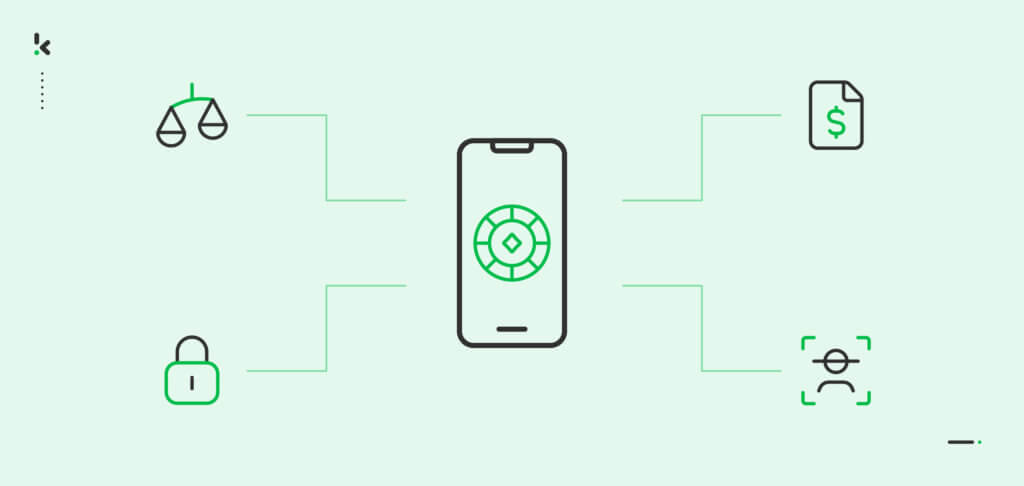

As consumer preference shifts toward digital services, the online gambling market is expected to reach US$95 billion in revenue and more than 176 million users globally in 2023. However, as technology advances, so too do the tactics of those seeking to exploit the system. The sophistication of fraudsters has reached unprecedented levels, posing a significant challenge to the online gambling industry.
The FBI has estimated that in 2022, the total loss from fraud in the USA was $10.2 billion. This amounts to almost twice the losses experienced in 2021 ($6.9 billion). Furthermore, 21% of the reported cases involved identity fraud, pointing out more than $2.1 billion in losses. That’s quite a lot, right?
To ensure a fair and secure digital gambling environment, online gambling companies should implement robust KYC practices. By verifying the identities of new customers, the industry can deter money laundering while gaining trust and credibility.
In this blog, we’ll explore the significance of ID verification, investigate the latest changes in legislation, and introduce an automated identity verification solution that can benefit any online gambling company.
The Role of ID Verification in the Gambling Industry
The digital transformation of the gambling industry brings new challenges to the board. Without the personal touch of traditional gambling establishments, digital service providers must rely on secure and frictionless identity verification solutions. User checks shield the company against multiple account creation, money laundering, and identity fraud, ensuring that players are who they claim to be.
Yet, implementing this step is challenging for many online casinos. The problem here comes down to the variation between different government legislations. International companies must keep track of all the changes in global regulations and find the right solution for each country’s requirements.
The resource-draining implementation of multiple identity verification models can be avoided by adopting a single versatile solution that meets most regulatory requirements.
Changes in Gambling Legislation Worldwide


To understand the challenges faced in the global online gambling industry, let’s look at the latest regulatory changes in:
- The Netherlands
- Australia
- Finland
Combatting gambling addiction in the Netherlands
The KSA, a Dutch gambling authority, claims that online betting sites do not sufficiently protect players who show signs of gambling addiction, especially new gamblers. Since 60% of the 365,000 players who played online at least once a month in 2022 were new gamblers, the KSA has demanded legislation strengthening. The operators have to implement a structured process to help new users combat addiction.
For example, frequent proof of income and customer transaction checks can uncover gambling problems early. Additionally, gambling providers can use AI detection to flag problematic playing patterns and safeguard customers.
Mandatory user pre-verification in Australia
Faced with age and exclusion list verification challenges, on September 29, 2023, Australia implemented mandatory pre-verification for online gambling. The regulation comes from a need to ensure responsible gambling by mitigating fraudulent and money laundering activities. Now, users are allowed to place bets only when the account verification is completed.
Under the old legislation, a customer’s identity had to be verified within 30 days but users could already deposit money before the account was verified. It allowed gambling sites to process thousands of dollars without performing Know-Your-Customer (KYC) checks.
Transition to gambling licenses in Finland
The recently elected government in Finland has disclosed that it’s committed to restructuring the gambling industry from a monopoly to a licensing model. The current gambling policy has not lived up to expectations. According to IGB, despite the regulations, close to 50% of gambling activity is still happening outside the legally-regulated market. The Finnish government’s inability to control the industry has led the country to lose large sums of tax revenue.
While the monopoly model lacks efficiency, it isn’t the only obstacle the government has faced. The administration also emphasized the legislation’s strictening to stop money laundering and abuses of sports fairness. The request for other KYC documents, such as proof of income (POI) or proof of address (POA), can depreciate the ongoing fraud.
As online gambling companies navigate the ever-changing waters of gambling regulations, they shift more and more towards the use of automated ID verification solutions. These solutions not only streamline the complex task of identity verification but also act as a way to meet the demands of evolving regulations.
Let’s explore the two ways to verify a user’s identity, automated and manual, to prove our point.
Automated vs Manual Identity Verification


When it comes to onboarding new players, there are two main routes: manual verification and the automated alternative.
How to manually verify a player’s identity?
Let’s first walk through the steps of manual verification:
- First, users provide basic information such as name, address, and date of birth
- The gambler is required to submit scanned copies or clear photos of specific identification documents
- A staff member checks the authenticity of the document and verifies that the information on the document matches the details provided during the registration process
- To avoid any human errors, the entered data has to be double-checked
- The player’s account has been successfully created and the customer can start gambling
How to automatically verify a player’s identity?
While traditional manual ID verification processes offer some level of security, they fall short in several critical aspects, particularly in terms of efficiency and accuracy. Let’s now walk through the steps of automated verification:
- Users upload a picture or scan of their identity document(s) to the gambling site’s website/application. Depending on the country of residence, the required document can be an ID card, passport, or driver’s license
- Optical Character Recognition (OCR) software extracts the needed information from the document(s) and compares it to the registration information
- Optionally, the user proceeds to biometric verification. With the use of AI algorithms, an individual’s unique characteristics, such as facial characteristics, can be compared to the input (i.e. the picture on the identity document)
- After successful verification, the user gets access to the gambling site
Accurate ID verification is essential for any online gambling company. An automated solution can give users an extra layer of protection to detect fraud, prevent underage gambling, and detect money laundering. Let’s take a closer look at these and other benefits of an automated ID verification solution.
The Benefits of Automated ID Verification


As we’ve seen, many countries and regulatory bodies have introduced strict ID verification measures for individuals looking to engage in gambling activities. Therefore, international companies choose to automate their ID checks. The streamlined process offers several benefits for a safer and more responsible gambling environment. Let’s go over them one by one:
- Reduce costs and errors
- Improve speed
- Ensuring compliance and trust
- Preventing fraud and money laundering
Reduce costs and errors
Undoubtedly, employees are susceptible to the occasional human error, an inherent aspect of manual tasks. Yet, in industries such as gambling, where the stakes are high and a single mistake could translate to significant financial losses, the margin for error is nonexistent.
Automated identity verification emerges as a practical solution, effectively removing the human error variable from the equation. This not only streamlines processes but also fortifies the verification step, ensuring a more accurate and secure outcome.
Improved speed
A paramount challenge seen by manual identity verification is the onboarding time. Adhering to stringent government regulations often requires agents to perform multiple cross-checks across a multitude of databases, a process that is inherently time-consuming and non-scalable. By seamlessly integrating with databases and employing advanced algorithms, automated systems quickly cross-reference information, expediting the verification process. This efficiency not only enhances speed but also contributes to a more seamless and reliable user experience.
Understanding the critical role of onboarding time in shaping consumer perceptions, online gaming company PlayNorth took proactive steps to enhance its customer experience. Teaming up with Klippa, the company achieved a remarkable 73% reduction in onboarding time.
Ensuring compliance and trust
Age verification stands as a pivotal tool in ensuring strict compliance with regulations. By confirming that a player is older than the age limit, the company prevents minors from accessing a gambling site. It’s a crucial step to safeguard the younger generation from gambling addiction and other harm.
By efficiently verifying the identity and age of players, a gambling platform communicates the dedication to responsible gaming practices. Users knowing that their personal information is secure are more likely to trust the company and less likely to worry about identity or financial theft.
According to the PwC 2022 consumer report, 71% of customers would buy less from a company that lost their trust, while 91% would buy more from a company that gained it. Likewise, in the online gambling industry, the security of user data is essential for building trust between users and providers.
Preventing fraud and money laundering
With the automation of identity verification in gambling, businesses can eliminate fraud and money laundering. Some of the remedies include:
- Identifying users who are creating multiple accounts to receive bonuses several times
- Confirming that the user is the legitimate owner of the submitted identity document
- Verifying that the credit or debit card used to make a deposit is owned by the user
- Requesting Proof of Address and Proof of Income that can detect users who are attempting to deposit large sums of money without the funds for it
The earlier points highlight how solid security measures can keep most fraud at bay for corporations. But let’s not overlook how identity verification can boost businesses by building trust and credibility with customers.
While there are several solutions out there, only a few stand out with their exceptional service quality. Let’s look at the identity verification solution that Klippa provides!
ID Verification in Gambling with Klippa
Klippa’s AI-powered Gambling Identity Verification is a great example of an automated ID verification solution. There are several reasons why Klippa stands out among the other solutions.
As part of our dedication to data security and anonymization, our GDPR-compliant solution employs cutting-edge methods to safeguard your private data. Additionally, we have ISO 9001 and 27001 certifications, so you can be assured that your data is secure with us.
Additionally, Klippa can also:
- Flag fraudulent activity by scanning the Machine Readable Zone (MRZ)
- Ensure customer data privacy. Klippa does not store customer data. It’s completely inaccessible to unauthorized users
- Provide NFC verification and let your customers simply move their identity documents to a near distance from their smartphone and see the magic happen
- Integrate the solution within your gambling site or mobile application with our SDKs and APIs
- Provide automated Proof of Address or Proof of Income checks
- Support 500+ different types of ID documents from more than 150 countries
Are you interested in knowing more about our solution? Feel free to contact us or book a demo below!